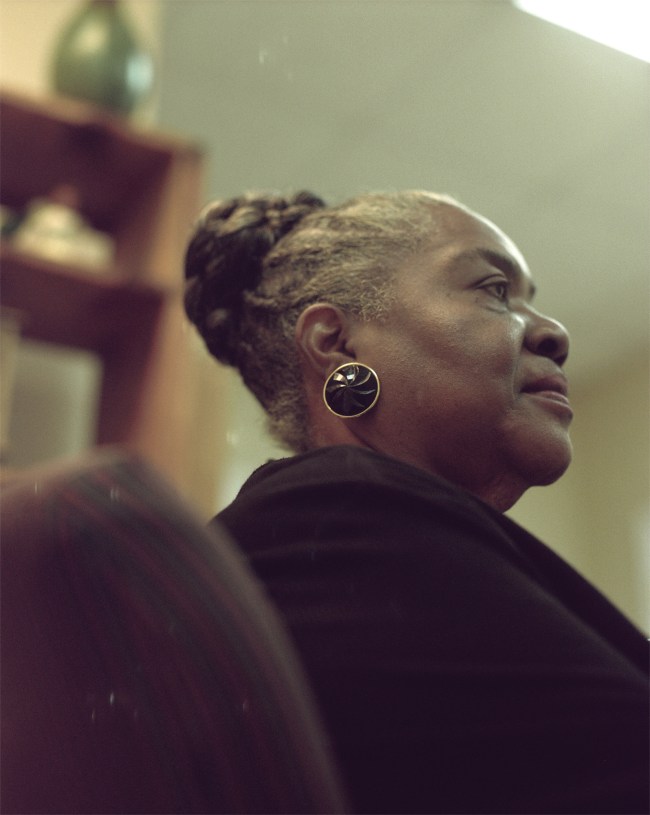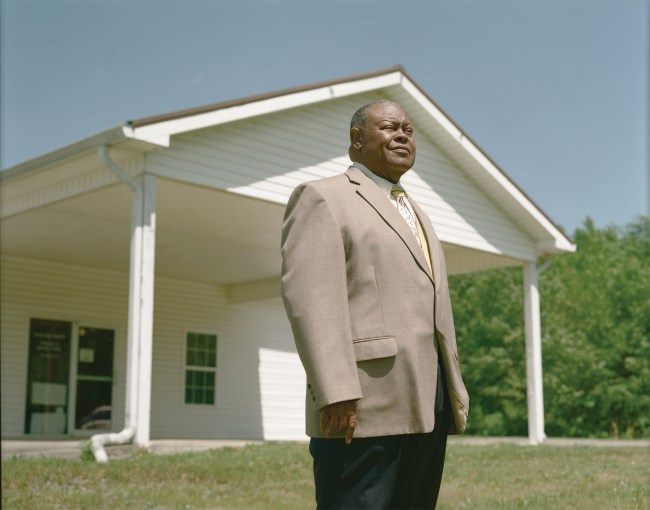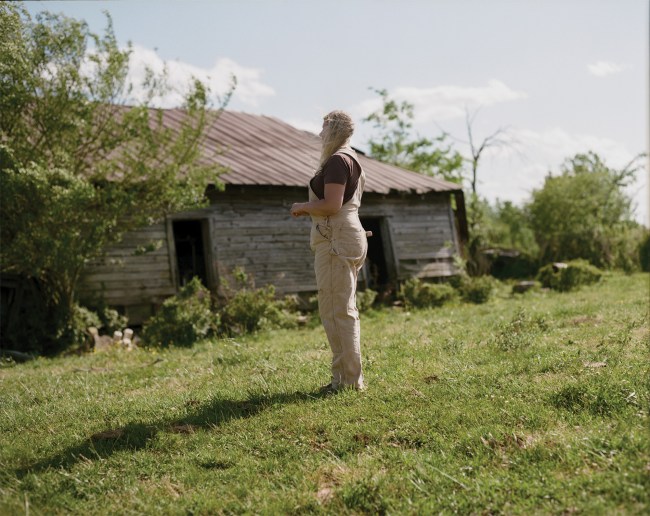Friends and neighbors Stacie Marshall and Melvin and Betty Mosley chat over coffee in Marshall’s farmhouse kitchen in Dirt Town Valley, Georgia. Windows frame cattle pastures in every direction as they catch up on family weddings and local farming news. A mass of cheerful daffodils rests on the table between them.
On the surface, this encounter seems like any other between close friends. But a striking history sets their relationship apart—Betty Mosley’s great-great-grandmother was enslaved by Marshall’s great-great-great-grandparents in this community 150 years ago.
Marshall, 43, a mother of three and former campus minister, has been friends with the Mosleys for decades in this largely segregated corner of Northwest Georgia. Her father grew up as best friends with Melvin Mosley, and Melvin was her assistant high school principal.
Stacie Marshall and the Mosleys did not know their shared painful past until it was uncovered in 2021 through a Berry College documentary called Her Name Was Hester. The filming began in 2015 and followed Marshall’s discovery of her family’s history and her attempts to reconcile with the descendants of those they enslaved as she learns to run her family’s 300-acre cattle farm.
In 2017, Marshall was clearing out the family farmhouse when she discovered an 1860 county slave schedule in a boot box. The document, which listed enslaved people as part of the federal census, confirmed what her grandfather had told her years before—that her great-great-great-grandfather had purchased seven people, including a wet nurse named Hester.
“My grandparents are dead, and now all of this belongs to me,” Marshall remembers thinking. She described the strange feeling of shame that came with finding her family’s documents, even though she was generations removed from the slavery.
Marshall first turned to the Mosleys, her spiritual mentors, as she sought to find Hester’s descendants and make amends. Though she knew them well, she approached the meeting with trepidation, concerned the story would bring pain. But she found that the Mosleys welcomed the conversation. “I’m having to unlearn the idea that silence is protective,” Marshall said.
Melvin Mosley, a 69-year-old principal turned pastor, spoke a prayer over Marshall that day that she calls “one of the defining moments of my life.”
“He has known and loved generations of my family,” Marshall said, “and that day, he prayed, ‘Lord, break this generational racism that might exist.’”
Years went by as Marshall and the Mosleys began leading racial reconciliation efforts in their community together. The Berry documentary continued to film their progress, and in 2021 The New York Times profiled their relationship. Two weeks later, a local historian’s genealogical research unlocked a stunning development: Hester’s great-great-granddaughter was Betty Mosley.
 Photography by Rita Harper for Christianity Today
Photography by Rita Harper for Christianity Today“It was shocking,” said Betty, 67. “How in the world did this happen?” She knew that most of her Black community had roots in slavery and sharecropping. In fact, her mother had been a sharecropper who picked cotton. But she never suspected a connection with Stacie Marshall.
After hearing the news, Betty stayed up all night searching for family records. And then she called Marshall the next day to say, “I just want you to know that this doesn’t change the way I love you.”
Melvin and Betty Mosley have been working toward racial reconciliation for decades in this county of 25,000, most recently through Harmony Baptist Church, an interracial congregation that Melvin has pastored for the past two years. Harmony was founded to be “a worship place for every race.”
But racial reconciliation hasn’t always come easy to the Mosleys.
In his elementary years, Melvin noticed that his Black school got the leftover books from the white school. In college, he was told by one of his professors that he didn’t belong in the largely white setting. And as a young teacher, Melvin had to correct a white student who told him, “My daddy told me I don’t have to do what you say.”
When Betty was in seventh grade in 1967, the year schools were integrated in Chattooga County, a white boy called her a racial epithet on the bus. He walked out with a black eye.
Though she grew up in church, she said her faith in Christ deepened during her early years of marriage as she began to study God’s Word. Her early dreams of a big house, a nice car, and a swimming pool yielded to a deep desire to please God. “It’s like the hymn says,” she said. “You understand it better by and by.”
She and Melvin later participated in Race Relations Sunday, hosted annually by their home church, Oak Hill Missionary Baptist. Each year, the white church Stacie Marshall attended was invited to come worship at Oak Hill while the Mosleys’ Black pastor would preach at the white church, whose columns had been carved by enslaved workers.
Betty is redirecting the grit that silenced a middle-school bully decades ago. Today, she focuses on reaching all races with the love of Jesus Christ. Betty and Melvin often host activities like biscuit-making classes, fish fries, and other community events in their work with Harmony Baptist Church.
“I don’t care if they are white, Black, Mexican, or Asian,” Betty said. “I want them all. That’s the way it’s supposed to be—that’s the way it is in heaven.”
Melvin sees the potential to interrupt generational sin and build a more hopeful future. “In all our families, there are generational things it’s up to us to break,” he said. “And when we break them, they’re broken forever.”
 Photography by Rita Harper for Christianity Today
Photography by Rita Harper for Christianity TodayBoth Melvin and Betty understand the challenges they face in this work, even as they rely on God as the source of all love. “Love is hard,” Betty said. “People don’t always give it back to you. But it’s what the Lord requires of us.”
Sometimes love means pushing back against racism for the good of the community. Several years ago, a local official allowed a Confederate flag to be flown over the county courthouse. Betty and Melvin visited him and asked him to remove it. Several others protested too, and the flag eventually was taken down.
Through actions like these, the Mosleys are sharing Christ with their community. “Our goal is to make our town a better place to live,” Betty said. “As my relationship with the Lord [has grown], I want to make a difference in the world.”
Marshall continues to experience pushback as she shares her family’s story more widely, through both the Berry College documentary and The New York Times piece that featured her relationship with the Mosleys. Though she and her husband led a campus ministry at the WinShape Foundation at Berry College for 13 years (where he still works), she walks a tightrope with some fellow Christians who regard her with suspicion and a few of the local farmers she bumps into at the Dirttown Deli.
Melvin and Betty Mosley have helped guide her through this, cautioning, “You’re going to see a side of [some people] that you haven’t seen.” Marshall worried for the Mosleys too, but Melvin assured her they have been through worse. “I’ve been wearing this black suit my whole life,” he said with a grin.
But this is not a relationship defined by shared persecution. Instead, it is seen in the easy, warm way the Marshalls and Mosleys relate to one another, the good-natured ribbing, the deep family connections. Melvin performed Marshall’s brother’s wedding on a recent weekend, and her brother called her while the Mosleys and Marshalls were gathered in her snug kitchen. “How are the honeymooners?” Melvin bellowed to the phone across the room.
There have been hard conversations and tears along the way. Early on, trying to make sense of her family’s relationship with the people they enslaved, Marshall shared her family’s narrative about Hester: that she was so close with the Marshall family that she opted to stay with them after the Civil War. But the Mosleys reframed the story for Marshall: As a penniless Black woman, where else could she have gone?
“It’s a gift from the Lord to walk through this relationally, to not ignore it or be in bondage to it,” Marshall said, explaining that authentic repair can only come in relationship. “[The Mosleys and I] keep our own relationship rooted in what our strongest bond is—our Lord and Savior Jesus Christ.”
Betty Mosley sees relationship as the ultimate route to healing racial wounds.
“Relationship is everything,” she said. “You’ve got to have a relationship with Jesus Christ.”
She also seeks to share God’s love and ultimate reconciliation through the way she treats others. “I pray over my home because I want you to feel welcome in my home. I want you to feel comfortable talking to me. I may have an opinion, but I’m going to tell it to you from the perspective of the Lord.”
In an age of pitched debate and hot takes, the Mosleys’ steadfast, loving engagement stands in sharp relief. And it doesn’t come without a cost.
“As white people, we get to choose whenever we have this conversation,” Marshall said.
 Photography by Rita Harper for Christianity Today
Photography by Rita Harper for Christianity Today“But the Mosleys never had a choice. It helps me understand what has been required and how they have held this history the way they have.”
One of the Mosleys’ daughters told Marshall, “I just want you to share the wound with us. Because it’s heavy, and we’ve had to carry it for a long time.”
This outlook helps Marshall respond when some paint her as a white savior: “I’m learning to be misunderstood.” That’s a small solidarity in walking alongside her Black neighbors, she said. “It’s okay if people don’t understand my motives.”
As Marshall continues to wrestle with her family’s history, she is considering how to use the additional land she will inherit to further the work of reconciliation in her community. It’s a fraught topic, echoing a larger national debate around reparations.
“It’s something I’m going to be working out the rest of my life,” she said, noting that reparation is about repair at its core. “What does repair look like in community? In relationship?”
One example she offers is her father and Melvin Mosley’s lifelong friendship: “It has been very formative to my faith journey.” The church she grew up in focused heavily on conversion and the Great Commission. “But Daddy and Melvin were centered on ‘God is going to bring who he’s going to bring to himself. And if he uses me, that’s wonderful.’”
“That has been profound for me,” Marshall said. “I am just going to be love, because I am loved.”
She appreciates the way Jesus went about repair during his life on earth, in effect saying, Something of harm has happened here—sin. Let’s repair it, and that can only be done through my death and resurrection.
At its center, repair is about dying to self, she said, citing Galatians 6:2: “Carry each other’s burdens, and in this way you will fulfill the law of Christ.”
“He broke bread and body so we could be reconciled to God,” Marshall said. “He showed how to walk out repair in human relationships.”
And she sees racial reconciliation as a fundamental way to express her Christian faith, referencing Matthew 18:15. “It’s not a chore to do this,” she said. “It feels like all these sermons and Scriptures living inside of me is all for this moment. This is how I can walk out my Christian faith tangibly.”
Her Name Was Hester examines personal and societal repair as they relate to reparations. Black farmer Matthew Raiford says in the film, “Reparations are about more than land or money—it’s a conversation to have. It’s not one size fits all.”
The film’s director, Brian Campbell, an associate professor of anthropology and chair of environmental science and studies at Berry, has seen the impact the film makes on viewers. A Black community organizer who saw the film at a screening in Rome, Georgia, told Campbell that it changed his perception of what reparations might look like.
“The film presents the idea that really spending time with your neighbor of a different background will provide opportunities for connection that you didn’t anticipate,” Campbell said. “Engaging in genuine dialogue and conversation will lay the groundwork to move toward reconciliation.”
Haley Smith, Berry’s director of diversity and inclusion, is creating lesson plans and discussion guides for churches, schools, and community groups. Her Name Was Hester has been screened at film festivals from Arizona to New York over the past year.
Assessing reparations, Melvin Mosley said, “It’s the heart that has to be changed.” He foresees a day when enough hearts are changed that people of color don’t have to be twice as good as others to acquire jobs or secure loans, as he experienced. “Everything we do today affects tomorrow. We’ve got to look forward and pay it forward.”
Betty put it more simply: “Reparations to me is that Stacie don’t teach her kids to be prejudiced.”
To this end, the Mosley and Scoggins (Marshall’s father’s side) families founded Hester’s Heritage Foundation in 2021 to support Black history preservation, education, and farming initiatives. The foundation hosts groups at the farm to preserve enslaved people’s unmarked graves, conduct discussions, and advocate for the prosperity of Black farmers, who currently make up only 1 percent of farmers nationwide.
“I know this land belongs to the Lord,” Marshall said. “I want to use it for the healing of the community.”
One way Hester’s Heritage Foundation is paying it forward is by screening Her Name Was Hester and leading discussions with college students. “They are so committed to seeing a better world,” Marshall said.
At a Hester’s Heritage event at the farm last year, a group of Berry students gathered around to hear stories from 95-year-old Dirt Town Valley resident Clemmie Black, an educator who had taught in Chattooga County schools for decades before they were integrated. Her grandmother had been enslaved and would measure flour and sugar with her hands when baking because she couldn’t read or write.
Over the years, Black not only attained an education but was able to teach and influence generations in this area, sowing small seeds of hope.
Marshall shares the same motivation as she works with the Mosleys to undo the racial dynamics they inherited. “I just want to keep sowing good seeds alongside the Mosleys,” she says in Her Name Was Hester.
Marshall marvels at this improbable story that has affected so many lives over so many years and has led to two friends sharing coffee on a quiet morning. “We could not have written this story,” she said. “It feels miraculous.”
Sitting in Stacie Marshall’s kitchen, Betty Mosley reflects on the changes she has seen within her lifetime in Dirt Town Valley: “Even though my great-great-grandmother was born a slave, I was born free. Jesus said, If the Son sets you free, you are free indeed.”
She rests her elbows on the counter beside the bright daffodils, the first flowers to bloom at the end of winter.
“I am free indeed.”
Melissa Morgan Kelley is a journalist based in Atlanta.















